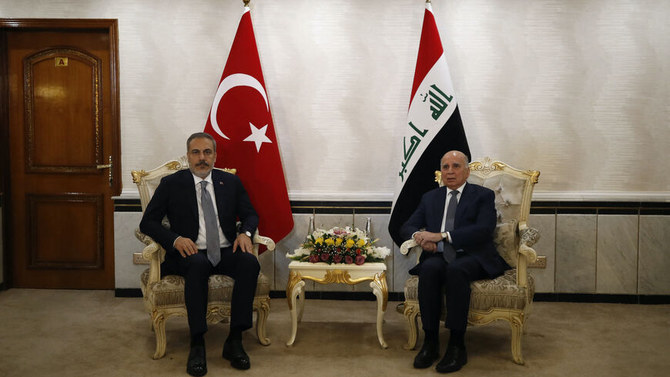
- ARAB NEWS
- 11 Jul 2025

The last week has seen a busy diplomatic to-and-fro between Ankara and Baghdad, with an exchange of ministerial visits that hints at crucial messages on the future of Turkish-Iraqi relations. Turkish Foreign Minister Hakan Fidan, the former spy chief, visited Baghdad and Irbil for the first time since assuming the post. Meanwhile, Iraqi Oil Minister Hayan Abdel-Ghani was in Ankara for a two-day visit to discuss several issues that shape the bilateral relationship.
Historically, Turkish-Iraqi relations have seen their fair share of ups and downs due to several unresolved issues. For Turkiye, when it comes to relations with Iraq, three key factors shape its approach: the Kurdistan Regional Government, the terrorism of the Kurdistan Workers’ Party, known as the PKK, and Iranian influence. There are also three key factors for Iraq: transboundary water problems, the oil export issue and Ankara’s economic support for the country’s reconstruction. For years, these issues combined with each other, turning the Turkish-Iraqi relationship into a huge mess.
Will Fidan’s visit pave the way for a new Turkish policy toward Iraq that could lead Ankara to compartmentalize the issues with Iraq in a way that could benefit the interests of both sides? Most likely yes, but this seems mostly due to the adoption of a new approach, in which an economic agenda, rather than politics, is the driving force for bilateral relations.
Fidan’s visit to Irbil indicates the Turkish desire for a balanced policy between the KRG and Iraq. Ankara aims to pursue a delicate balancing act between Baghdad and Irbil. However, this policy was severely tested when Iraq was dragged into civil war, terrorism and political conflict in the post-2003 era, especially with the country’s unstable political life, with a string of prime ministers having taken office since the US invasion, while Turkiye’s approach has been led by the same leadership.
Historically, Turkish-Iraqi relations have seen their fair share of ups and downs due to several unresolved issues.
Sinem Cengiz
The fluctuation in Turkish-Iraqi ties led Ankara to pursue a policy that capitalized on the rivalry between Baghdad and Irbil, including cultivating closer political and trade relations with the latter. However, since the failed Kurdish independence referendum that was held in 2017, Turkiye has adopted a new approach in dealing with both Irbil and Baghdad. This has been based on a more equal approach, rather than favoring one side over the other.
The PKK issue has been a challenging one in Turkiye’s relations with both the KRG and Iraq. In terms of the KRG, Ankara seeks to cultivate ties with two main political entities: the dominant Kurdistan Democratic Party and the rival Patriotic Union of Kurdistan. The KDP, which maintains close political and economic ties with Ankara, is at odds with the PKK due to ideological and political differences. The PUK, which does not enjoy the same ties with Ankara, maintains close relations with Iran and is suspiciously perceived by Turkiye due to its alleged affiliations with the PKK. Ankara is now trying to approach the PUK and it expects the PKK issue to be addressed in the same way the KDP does.
Turkiye’s military operations and its military base in Iraq have long tested its relations with Baghdad. However, in recent years, Baghdad has avoided feuds with Ankara to preserve relations, especially those from an economic standpoint. During his Baghdad trip, Fidan asked Iraq to designate the PKK as a terrorist organization.
As a former spy chief, Fidan was one of the key architects of Turkiye’s Iraq policy and he has contacts with Kurdish political actors inside the country. His appointment as foreign minister may lead to a significant paradigm shift in Turkiye’s Iraq policy, in which diplomatic initiatives could be integrated with security and economic objectives.
There are also other factors that are vying for a greater Turkish role in Iraq. Geopolitically, Iraq is important not only to Turks but also to the Iranians, making the country a centerpiece of their rivalry as they jockey for regional influence. This Turkish-Iranian rivalry also shapes the Iraqi political scene, which plays an important role in Turkish calculations.
There is a new approach, in which an economic agenda, rather than politics, is the driving force for bilateral relations.
Sinem Cengiz
From the Iraqi perspective, trade and energy factors are powerful variables informing the country’s approach to Turkiye. The dispute over shared water from the Euphrates and Tigris rivers is a long-standing one, causing occasional tensions between Ankara and Baghdad. During Fidan’s visit, Iraq and Turkiye agreed to establish a permanent joint committee to resolve water-related issues. This is a perfect way to make the water issue an area for cooperation, rather than contention.
Second is the oil issue. The Iraqi oil minister was in Turkiye for talks on the possibility of resuming the KRG’s oil exports through Turkiye’s Ceyhan port, which has been on hold for nearly five months. However, the two sides failed to agree on the resumption of oil exports.
The other topic is Turkiye’s support for Iraq’s reconstruction. At the beginning of 2018, Turkiye was eager to commit a $5 billion loan to support reconstruction in Iraq. Baghdad hopes to receive Ankara’s support for the massive Development Road, also known as the Dry Canal project — a highway and rail line from the southern Iraqi city of Basra to Turkiye, which is an important area of Turkish-Iraqi cooperation.
Fidan’s trip was expected to prepare the ground for a visit by Turkish President Recep Tayyip Erdogan, a date for which has not yet been set. The visit indicates that Turkiye is likely to prioritize economic relations above all else, such as it has done with other regional countries, and this will lay the groundwork for cooperation in other areas with time. Handling each contentious issue, such as the PKK, water or oil, in a different file will also enable Turkiye and Iraq to achieve a new dynamism in their relationship.